Indy Editors’ and Staff Writers’ Picks: Recommended Good Reads from 2024

Photo: Booshop.org (CC BY-SA 2010)
Compiled by Art Keene and Jeff Lee
This is the fifth year that we offer recommendations from our editors and staff writers of some of our favorite reading from the past year. Feel free to share your own best reading experiences from the past year in the comments section below. And following our own recommendations, we offer a compilation of links to other “best of” lists for good reads from 2024 further below
If you’d be interested in writing book reviews for the Indy, please drop us a note at amherstindy@gmail.com.
Here you can check out our favorites from 2023, 2022, 2021, and 2020.
Kitty Axelson-Berry
There are Rivers in the Sky by Elif Shafak (Knopf, 2024)
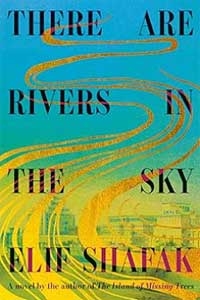 | Elif Shafak, a well-known feminist writer in Turkey but hardly a household name here, is my hands-down new favorite author, and There Are Rivers in the Sky is my favorite of her historical novels so far. Her stories involve a deep love of Sufism and Islam, an equally deep horror of wars and conflict, as well as discussions of spiritual traditions, religious and political hierarchies, power struggles, gender politics, class issues, the city of Istanbul, Turkish foods and architecture, and family relationships, and are thoroughly sprinkled with old wives’ tales from Turkey and elsewhere in the Mesopotamia region. Here, we’re introduced to three characters, and a host of ancillary characters, connected through shared histories and a single drop of water: 19th-century archaeologist Arthur, born into poverty and alcoholism by the Thames River; Narin, a 21st-century Yazidi teen from Turkey and Iraq who gets caught up in the 2014 Yazidi genocide; and Zaleekah, a water scientist living by herself on a Thames River houseboat in 2018. I learn so much and am so moved by this writer (and it turns out she lived in the Valley while teaching at Mt. Holyoke College for a year). |
Art Keene
Fixer Upper: How to Repair America’s Broken Housing Systems by Jenny Schuetz (Brookings Institution Press, 2022)
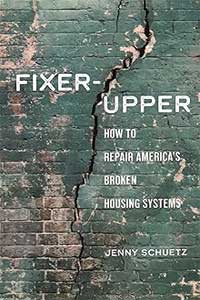 | Homelessness in the U.S. increased by 18% last year and with each passing year more Americans find the prospect of purchasing a home well beyond their means. The consequences of housing becoming more inaccessible for a greater percentage of Americans are far reaching, touching on public health, environment, economy, and social justice. This slim volume (166 pages not counting the footnotes and bibliography) offers an accessible explanation for why the crisis exists and solutions for turning things around. Put simply, housing policy now works to exacerbate housing inequalities. Economist Jenny Shuetz shows us how this works and argues that we need new policies to undo the damage. But a major obstacle is that the folks who make the policies (and indeed, folks who are currently well-housed) benefit from the way things are. One example of a solution Shuetz offers is to get rid of exclusionary zoning, such as subdivisions that only permit single family homes on large lots. Such zoning prevents the kind of density necessary to increase the availability of housing and drives up housing prices. Schuetz doesn’t suggest that there are easy and quick fixes to the spiraling crisis which, after all, has evolved over decades, but she offers us a clear vision of how previous and existing policies created the mess we’re struggling with today as well as a number of new or modified housing policies that offer a path out of that mess. She doesn’t explicitly deal with the political challenges of making policy change but offers enough success stories to allow us to embrace the possibility of change. Schuetz’s analysis focuses on large urban settings but it’s not hard to see how her recommendations could be impactful for the better, even in tiny Amherst. The book is clearly written in accessible language and leavened with concrete examples from cities across the U.S. It’s a quick read that nonetheless leaves the reader feeling like they can understand the current crisis and believing that there is something to be done about it. |
Two Science Fiction Trilogies
The Children of Time Trilogy by Adrian Tchaikovsky:
Children of Time (Orbit, 2018)
Children of Ruin (Orbit 2019)
Children of Memory (Orbit 2023)
The Semiosis Trilogy by Sue Burke
Semiosis (Tor, 2018)
Interference (Tor, 2019)
Usurpation (Tor 2024)
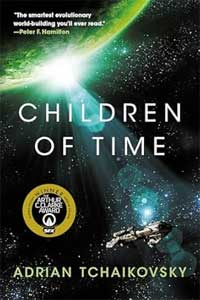 | These two trilogies explore human encounters with alien intelligences and both avoid the cliché/pitfall of anthropomorphizing those intelligences. Both adopt a storyline of a human expedition fleeing a dying earth that has been ravaged by warfare and climate change, and begin with the refugees arriving at a new planet in a distant star system with the intention of colonization. There, they encounter alien intelligences (some of which are superior); in Children of Time it’s sentient arachnids (at first) and in Semiosis it’s sentient plants (at first). Both series deal somewhat with the challenges and improbability of successful planetary colonization but the focis is really on interspecies engagement. Both trilogies offer thoughtful world-building and entertaining story-telling. Both raise provocative questions about what it means to be human. I found the Semiosis series to be a bit more intriguing, perhaps because the idea of sentient plants (which is cleverly imagined I think) is harder to wrap one’s head around, and possibly because in books 2 and 3, the human colonists, who have been transformed by life among other sentient species, resume contact with a damaged earth, which generates all kinds of drama. To say more would be a spoiler. Children of Time was winner of the 2018 Arthur C. Clarke Award. Semiosis was listed on the Esquire Magazine list of Best Science Fiction Books of All Time. |
The Deadly Rise of Anti-science: A Scientist’s Warning by Peter J. Hotez (Johns Hopkins University Press, 2023)
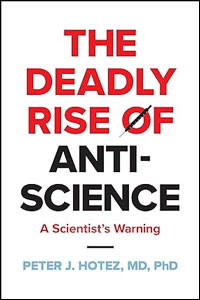 | This recommendation is a redux from last year. Given, the anticipated appointment of anti-vaxxer Robert F. Kennedy Junior to be Secretary of Health and Human Services, his vociferous antipathy to vaccines, the open discussion swirling around him generating fear and suspicion about the long-established polio and measles vaccines, and an ever intensifying smear campaign against vaccine scientist Peter Hotez by right wing media, it is worth revisiting the warnings contained in this book. This book, essentially a memoir of how vaccine scientist Hotez has been demonized for decades by anti-vaccine zealots, shows how the anti-vaccine movement has evolved from an effort focused on disseminating health disinformation to become an essential element of extremist politics. This slim volume documents the rise of the anti-vaccine movement in America and its integration into far-right politics. Hotez, whose resume includes the development of a free COVID-19 vaccine for developing countries, documents his own career-long harassment by the movement, which intensified during the COVID-19 epidemic when the anti-vaccine crowd labeled him (along with CDC Director Anthony Fauci and other public health officials) a public enemy and called for his execution. That national vilification by outlets like Fox News and Meta produced a slew of death threats against Hotez and his family. The book provides a clear picture of how the anti-vax movement has become integral to right wing politics and how some social media and corporate media have been instrumental in disseminating disinformation about vaccines while demonizing those who do the research and promote public health. The book lacks a political analysis of why the movement has gained so much traction at this particular moment. But it does provide a clear and sobering picture for how the war on vaccines — and by extension, on science — has taken root in this country, and offers a warning about the dangerous places that this can take us. See also Vaccines Did Not Cause Rachel’s Autism:My Journey as a Vaccine Scientist, Pediatrician, and Autism Dad by Peter Hotez (Johns Hopkins University Press, 2018) and Preventing the Next Pandemic: Vaccine Diplomacy in the Time of Anti-Science by Peter Hotez (Johns Hopkins University Press, 2021) |
Maura Keene
James: A Novel by Percival Everett (Doubleday, 2024)
 | James: A Novel by Percival Everett, is on just about every “best of” list for 2024, and it deserves it. This slim volume retells Mark Twain’s Huckleberry Finn from Jim’s point of view. When Jim hears a rumor that he is about to be sold and be separated from his wife and daughter, he plans an escape and is joined by Huck Finn, who is running away from his violent father. The book emphasizes the competence and intelligence of Jim and the other slaves, and how they work to “manage” the whites who own them. When speaking to whites, Jim, known among the slave community as James, speaks in a dialect with nonstandard grammar; but among themselves, the slaves speak eloquently. James tells a young slave, Lizzie, whom he is coaching in how to behave, “Mumble sometimes, so they can have the satisfaction of telling you not to mumble. They enjoy the correction and thinking you’re stupid.” The book combines wry humor with a harrowing adventure of escape, but the “good guys” survive and thrive by outwitting those with more power and privilege. This is an enjoyable and well-written novel, and now I need to go back and read Huckleberry Finn. James: A Novel was the winner of the 2024 National Book Award and was a finalist for the Booker Prize. |
This Is Happiness by Niall Williams (Bloomsbury Publishing, 2019)
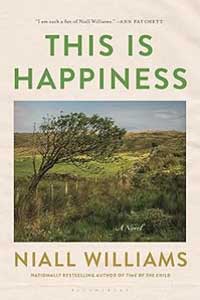 | This Is Happiness by Niall Williams is a beautifully written tale of the coming of electricity to the small town of Faha in County Clare, Ireland. The narrator is 78-year-old Noe who remembers the summer he spent with his grandparents in Faha when he was a teenager and had dropped out of seminary after his mother’s death. Williams populates Faha with colorful personalities, a mystery love story, and Noe’s own first crush. But it is his prose that made the greatest impression on me. Noe says of his grandfather’s storytelling, “One of the unwritten tenets of the local poetics was that a story must never arrive at a point or risk conclusion. And since because in Faha … time was the only thing people could afford, all stories were long, all storytellers took their and your, and anyone else’s time, and all gave it up willingly, understanding that tales of anything as aberrant and contrary as human behavior had to be so long that they wouldn’t, and in fact couldn’t, be finished this side of the grave, and only for the fire going out and the birds of dawn singing might be continuing still.” I have not read Williams’ other two Faha novels, History of the Rain, published in 2014, and the newly published Time of the Child, both of which received excellent reviews, but I have them on my reading list for 2025. |
Jeff Lee
Patriot by Alexei Navalny (Knopf, 2024)
 | Vladimir Putin antagonist Alexei Navalny dedicated his life to exposing corruption in the Russian political system and paid the ultimate price. His memoir offers a chilling glimpse of how an authoritarian dictatorship can masquerade as a working democracy. I found one quote to be a particularly resonant indictment of political secrets and lies, and an argument for the importance of a probing press: “The standard and completely moronic response of the Soviet – and subsequently of the Russian – authorities to any crisis is to decide that it is in the interests of the population that they should be lied to endlessly.” |
Going to Extremes by Joe McGinniss (Knopf, 1980)
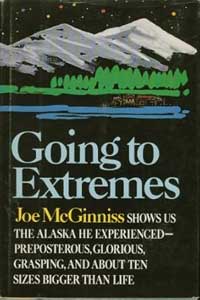 | In an age when there are more good books being published than can possibly be read in a lifetime, I won’t claim that Going to Extremes is a monument of literature. But as someone who finds himself living in Alaska for part of the year while my wife teaches at the university in Fairbanks, I found many nuggets of insight and plenty of laughs in McGinniss’s Alaskan travelogue. The author is better known for The Selling of the President 1968 and the controversial true crime book Fatal Vision. McGinniss lived in nearby Pelham until his death in 2014. |
Other “Best of” Lists for 2024
Lit Hub:
The Ultimate Best Books of 2024 List (a compilation from all of the best “best of” lists. Really, the best, “best of” list out there.)
The Best Reviewed Fiction of 2024
The Best Reviewed Non-fiction of 2024
Science Fiction and Fantasy:
Lit Hub’s 17 of the Best Science Fiction, Fantasy and Horror Books of 2024
Arthur C. Clarke Award Finalists 2024
Hugo Award Winners 2024
Nebula Awards for Best Science Fiction and Fantasy 2024
Esquire’s 30 Best Science Fiction Books of 2024
The Atlantic Magazine:
The Atlantic 10: The Books That Made Us Think the Most This Year (2024)
The Booker Prize:
The Booker Prize Winner and Long and Short Lists for 2024
Goodreads Reads
Goodreads Readers’ Choice Awards for 2024
The Guardian
The Best Books of 2024
The Jones Library
Most Borrowed Books of 2024
Mother Jones Magazine
Everyone Deserves a Break from the News – Best Books We Read This Year
The New Yorker
The Best Books of 2024
The New York Times
The Ten Best Books of 2024
100 Notable Books of 2024
The Progressive
The Progressive’s Favorite Books of 2024
Scientific American
78 Books Scientific American Recommends in 2024
